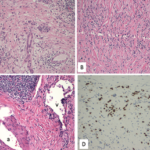“We call this ‘clinicopathologic correlation,’ and there is no disease for which it is more important than IgG4-related disease,” he says.
Dr. Stone also emphasizes that this clinicopathologic correlation, along with histologic features, are more important to establishing a diagnosis than the use of serum IgG4 concentrations, which, he says, are important, but need to be better understood.
Use of Glucocorticoids
One area of particular emphasis, according to Dr. Stone, is the use of glucocorticoids. Even though strong consensus was reached by the experts on the effectiveness of these agents as initial therapy for most patients, Dr. Stone emphasizes that glucocorticoids are often tolerated poorly, and disease recurrences are common during or after tapering off these agents.
“Our extensive experience with glucocorticoids in IgG4-related disease makes us keenly aware of the frequency with which these agents fail in IgG4-related disease and the high morbidity that can result if they are used inappropriately,” he says.
He also emphasizes that few data support the effectiveness of conventional steroid-sparing agents to treat IgG4-related disease.
Rather, Dr. Stone suspects that future treatment of IgG4-related disease will involve biologic therapies that he believes will “lead to dramatic improvements in clinical outcomes.”
Mary Beth Nierengarten is a freelance medical journalist based in St. Paul, Minn.
References
- Khosroshahi A, Wallace ZS, Crowe JL, et al. International Consensus Guidance Statement on the Management and Treatment of IgG4-Related Disease. Arthritis Rheumatol. 2015 Jul;67(7):1688–1699.
- Oxford Centre for Evidence-Based Medicine. 2009 March.


